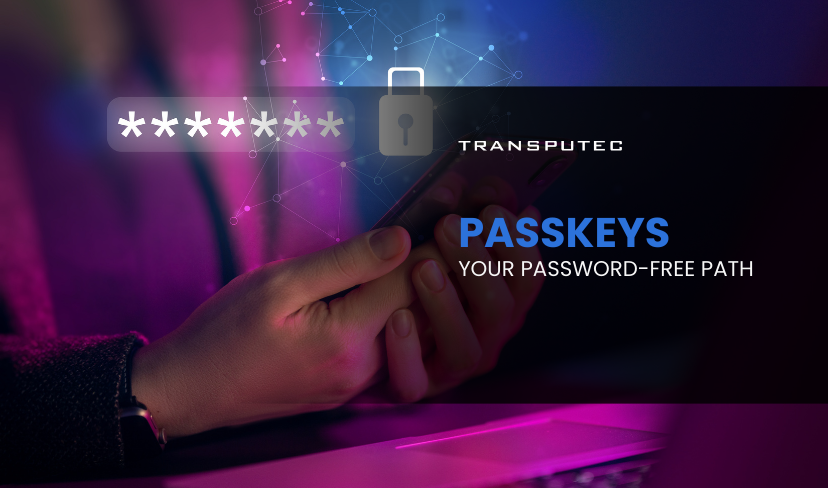Written by KRITIKA SINHA | MARKETING
Are you tired of managing countless passwords across your organisation? Research shows that the average employee juggles 191 passwords, with 49% storing them in plain text documents. This password chaos isn’t just frustrating – it’s dangerous. In 2023 alone, password-related breaches cost businesses an average of $4.5M per incident. But there’s a revolution happening in authentication: Passkeys.
This blog explores how passkeys are eliminating password vulnerability, simplifying user authentication, and why businesses are rapidly adopting this technology. We’ll dive into real-world implementation strategies and how they benefit your organisation.
Why does Password Protection Matter?
Password protection is crucial in today’s digital landscape as it serves as the first line of defence against unauthorised access to sensitive information and accounts. Strong passwords help prevent data breaches, financial fraud, and identity theft by making it difficult for cybercriminals to crack them.
With 81% of hacking-related breaches leveraging weak or stolen passwords, robust password security is essential for both individuals and organisations. By creating long, complex, and unique passwords for each account, using password managers, and implementing multi-factor authentication, users can significantly enhance their cybersecurity posture.
What’s the Problem with Passwords?
Passwords, despite their widespread use, present numerous security challenges for individuals and organisations:
1. Vulnerability to Attacks
Passwords are susceptible to various attack methods:
- Brute force attacks: Automated tools generate billions of password combinations until the correct one is found.
- Dictionary attacks: Common words and phrases are systematically tried to crack passwords.
- Phishing: Users are tricked into revealing their passwords on malicious websites.
- Keyloggers: Malicious software records keystrokes to capture passwords.
2. Human Limitations
People often create weak passwords due to:
- Short length: Passwords with fewer than eight characters are easily crackable.
- Lack of complexity: Simple passwords without a mix of uppercase, lowercase, numbers, and symbols are less secure.
- Predictability: Many use easily guessable information like common names, dates, or simple sequences (e.g., “123456”).
- Personal information: Incorporating easily accessible personal details makes passwords vulnerable.
3. Reuse and Management Issues
- Password reuse: Using the same password across multiple accounts increases risk if one account is compromised.
- Difficulty remembering: The need for unique, complex passwords for each account leads to forgetfulness and frustration.
- Insecure storage: Writing down passwords or storing them insecurely negates their protective purpose.
4. System Vulnerabilities
- Password file theft: If a system’s password file is stolen, even encrypted passwords can be cracked.
- Weak recovery mechanisms: Password reset systems can be exploited by attackers if not properly secured.
What Are Passkeys?
Passkeys represent a paradigm shift in how we approach digital security. Unlike traditional passwords, passkeys use public-key cryptography to create unique digital signatures for each authentication attempt. This technology, backed by industry giants like Apple, Google, and Microsoft, creates a seamless and significantly more secure login experience.
Recent data from the FIDO Alliance shows that organisations implementing passkeys report an 80% reduction in authentication-related support tickets and a 91% decrease in account takeover incidents.
Protect your Business 24/7 with Transputec!
Our Managed SOC Cost Calculator estimates potential expenses for security tools and other costs based on your requirements.
How Passkeys Work?
Passkeys work using public-key cryptography, providing a more secure and user-friendly alternative to traditional passwords. Here’s how they function:
1. Key Pair Generation:
When creating a passkey, the device generates a unique public-private key pair.
2. Registration:
The public key is sent to and stored by the service, while the private key remains securely on the user’s device.
3. Authentication Process:
- The service sends a random challenge to the user’s device.
- The device uses the private key to sign this challenge.
- The signed challenge is sent back to the service.
- The service verifies the signature using the stored public key.4. User Verification: To use a passkey, the user typically authenticates locally on their device using biometrics, PIN, or other built-in methods.
5. Synchronisation:
Passkeys can be synced across devices using secure password managers or cloud services.
This system eliminates the need for users to remember complex passwords while providing enhanced security against phishing and other common attacks.
The Benefits of Passkeys for Businesses
1. Enhanced Security
Passkeys offer a significant security upgrade compared to traditional passwords:
- Phishing-resistant: Passkeys are bound to specific websites, making them immune to phishing attacks.
- Elimination of weak passwords: With passkeys, there’s no risk of employees using easily guessable or reused passwords.
- Protection against data breaches: Even if a company’s servers are compromised, the stolen data is useless to attackers.
2. Improved User Experience
Passkeys not only boost security but also enhance the user experience:
- No more password resets: Employees can say goodbye to the frustration of forgotten passwords and frequent resets.
- Faster logins: Authenticating with a passkey is typically quicker than typing a complex password.
- Cross-device compatibility: Passkeys can be synced across multiple devices, ensuring seamless access.
3. Cost Savings
Implementing passkeys can lead to significant cost reductions for businesses:
- Reduced IT support costs: With fewer password-related issues, IT teams can focus on more strategic tasks.
- Lower risk of security incidents: The enhanced security of passkeys means fewer costly data breaches and associated damages.
- Increased productivity: Faster, hassle-free logins translate to less time wasted on authentication processes.
Implementing Passkeys: What Businesses Need to Know
1. Technology Readiness
Assess whether your organisation’s devices and systems support passkey technology. Modern operating systems, including Android, iOS, and Windows 11, already support passkeys, but legacy systems might require upgrades.
2. Adopting FIDO2 Standards
Passkeys work best when compliant with FIDO2 protocols, a global standard for passwordless authentication. Ensure your chosen passkey provider adheres to these standards.
3. Biometric Authentication
Equip your teams with devices that support biometric authentication, such as fingerprint readers or facial recognition systems.
4. Integrating With Identity Providers (IDPs)
Modern identity management tools, like Azure AD and Okta, integrate seamlessly with passkey systems, creating a unified access framework.
5. Ongoing Monitoring
As with any new system, proactive monitoring ensures stability. Partner with experts like Transputec for continuous oversight.
Conclusion
Passkeys are not just another security trend – they represent a fundamental shift in how we approach authentication. By eliminating the vulnerabilities associated with traditional passwords, passkeys offer businesses a more secure, user-friendly, and cost-effective way to protect their digital assets.
As we’ve explored in this blog, the benefits of passkeys are numerous and significant. From enhanced security and improved user experience to substantial cost savings, passkeys are set to revolutionise business authentication practices.
Ready to embrace the future of authentication and say goodbye to password management headaches? Contact Transputec today to connect with our experts and start your journey towards a more secure, efficient, and user-friendly authentication system. Let us help you unlock the full potential of passkeys for your business.

Secure Your Business!
Ready to explore how we can enhance your security posture? Contact us today to speak with one of our experts.
FAQs
What Are Passkeys, and How Do They Work?
It is device-based authentication credentials that eliminate the need for passwords. They utilise public-private key cryptography, pairing a private key stored on the user’s device with a public key linked to the application, ensuring secure authentication without password vulnerabilities.
How Does Transputec Support Passkey Adoption?
Transputec offers end-to-end passkey implementation services, including system assessment, deployment, user training, and ongoing technical support, tailored to your organisation’s needs.
Are Passkeys Safe for Remote and Hybrid Work Models?
Absolutely. It provides device-based security andintegratese seamlessly across platforms, making it ideal for diverse work models.
What Costs Can My Business Save with Passkeys?
It reduces costs related to password resets, data breach recovery, and IT support. The savings often exceed the upfront investment required for implementation.
Can Passkeys Integrate with Legacy Systems?
While it is designed for modern platforms, Transputec’s experts can help ensure smooth integration with older systems, minimising the need for expensive overhauls.




